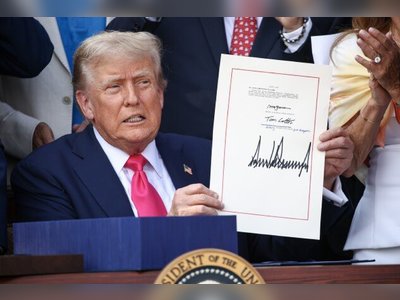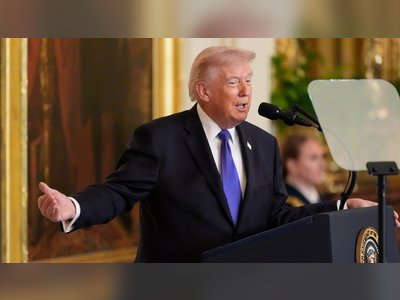Greenland's Prime Minister Calls for Independence in Light of Historical Strains with Denmark
Mute Egede's New Year address marks a crucial turning point in Greenland's quest for self-determination, as demands to break away from Denmark intensify.
In a striking New Year’s address, Greenland's Prime Minister Mute Egede reaffirmed his government's dedication to seeking independence from Denmark, viewing it as a critical step towards self-determination and equality.
This speech signifies a notable escalation in Greenland’s independence discourse, a sentiment that has gathered strength in recent years.
Since 1979, Greenland has functioned as a self-governing territory of Denmark and was granted the right to declare independence in 2009, bearing the legacy of a colonial past with lasting impacts.
Egede highlighted past injustices, such as Denmark's coercive birth control campaign in the 1960s, as indicative of a troubled relationship that, according to him, has not achieved complete equality between the two countries.
“It is about time that we ourselves take a step and shape our future, also with regard to who we will cooperate closely with, and who our trading partners will be,” Egede stated.
While the speech did not specify a timeline for an independence referendum, it stressed that the decision would ultimately belong to Greenland's 57,000 inhabitants.
The move toward independence, although widely supported, remains divisive.
Critics point to Greenland's economic frailties, given its economy's heavy reliance on fishing and an annual financial support from Denmark that constitutes nearly 20% of its GDP. Supporters, however, see promise in the island’s untapped reserves of minerals, oil, and natural gas that could sustain an independent Greenland's economy.
Egede’s address also hinted at Greenland’s desires to redefine its global partnerships.
“We must work to remove the obstacles to cooperation – which we can describe as the shackles of colonialism – and move forward,” he asserted, indicating a readiness to build ties beyond the Danish realm.
This aligns with Greenland’s recent moves to forge stronger connections with other countries, including the United States and its Arctic neighbors.
Greenland’s strategic value has not gone unnoticed internationally.
The Greenlandic government quickly rejected former U.S. President Donald Trump's controversial proposals to buy Greenland in 2019 and again last year, with Egede affirming, “Greenland is ours. We are not for sale and will never be for sale.”
Although Trump was not explicitly mentioned in the speech, the geopolitical stakes of Greenland’s sovereignty are significant.
Greenland’s capital, Nuuk, is nearer to New York than Copenhagen, highlighting the island’s importance as an Arctic gateway.
The region’s vast natural resources and strategic location have intensified global interest in its fate.
The upcoming parliamentary elections, anticipated before April 6, are set to throw the independence debate into sharper focus.
With Egede's administration introducing Greenland’s first draft constitution in 2023, the island’s path towards self-determination seems increasingly concrete.
Nevertheless, challenges remain.
While independence promises sovereignty and control, there are concerns about the potential economic and social transformations necessary to shift from a dependency model.
These issues will undoubtedly shape the ongoing dialogue as Greenland charts its course towards a future where autonomy becomes an imminent reality rather than a distant hope.
This speech signifies a notable escalation in Greenland’s independence discourse, a sentiment that has gathered strength in recent years.
Since 1979, Greenland has functioned as a self-governing territory of Denmark and was granted the right to declare independence in 2009, bearing the legacy of a colonial past with lasting impacts.
Egede highlighted past injustices, such as Denmark's coercive birth control campaign in the 1960s, as indicative of a troubled relationship that, according to him, has not achieved complete equality between the two countries.
“It is about time that we ourselves take a step and shape our future, also with regard to who we will cooperate closely with, and who our trading partners will be,” Egede stated.
While the speech did not specify a timeline for an independence referendum, it stressed that the decision would ultimately belong to Greenland's 57,000 inhabitants.
The move toward independence, although widely supported, remains divisive.
Critics point to Greenland's economic frailties, given its economy's heavy reliance on fishing and an annual financial support from Denmark that constitutes nearly 20% of its GDP. Supporters, however, see promise in the island’s untapped reserves of minerals, oil, and natural gas that could sustain an independent Greenland's economy.
Egede’s address also hinted at Greenland’s desires to redefine its global partnerships.
“We must work to remove the obstacles to cooperation – which we can describe as the shackles of colonialism – and move forward,” he asserted, indicating a readiness to build ties beyond the Danish realm.
This aligns with Greenland’s recent moves to forge stronger connections with other countries, including the United States and its Arctic neighbors.
Greenland’s strategic value has not gone unnoticed internationally.
The Greenlandic government quickly rejected former U.S. President Donald Trump's controversial proposals to buy Greenland in 2019 and again last year, with Egede affirming, “Greenland is ours. We are not for sale and will never be for sale.”
Although Trump was not explicitly mentioned in the speech, the geopolitical stakes of Greenland’s sovereignty are significant.
Greenland’s capital, Nuuk, is nearer to New York than Copenhagen, highlighting the island’s importance as an Arctic gateway.
The region’s vast natural resources and strategic location have intensified global interest in its fate.
The upcoming parliamentary elections, anticipated before April 6, are set to throw the independence debate into sharper focus.
With Egede's administration introducing Greenland’s first draft constitution in 2023, the island’s path towards self-determination seems increasingly concrete.
Nevertheless, challenges remain.
While independence promises sovereignty and control, there are concerns about the potential economic and social transformations necessary to shift from a dependency model.
These issues will undoubtedly shape the ongoing dialogue as Greenland charts its course towards a future where autonomy becomes an imminent reality rather than a distant hope.
















